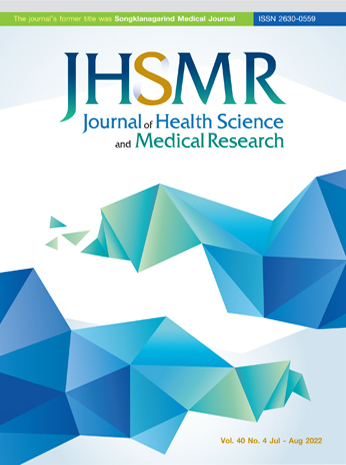PRRT2 Gene Analysis of Paroxysmal Kinesigenic Dyskinesia (PKD) in Thai Children
DOI:
https://doi.org/10.31584/jhsmr.2021853Keywords:
paroxysmal kinesigenic dyskinesia, PKD, PRRT2 gene, Thai childrenAbstract
Objective: To examine the frequency of the proline-rich transmembrane protein-2 (PRRT2) gene mutation in Thai patients with paroxysmal kinesigenic dyskinesia (PKD).
Material and Methods: A retrospective study of children aged 0-18 years with a diagnosis of PKD at Siriraj Hospital. The genetic analyses of the PRRT2 gene were done by bidirectional Sanger sequencing.
Results: Twelve patients with PKD were included. The known PRRT2 mutation, c.649dupC (p.Arg217Profs*8), was identified in three of the patients (25.0%), one of the nine sporadic cases (11.1%) and two of the three familial cases (66.6%), all from different families. PKD had a complete response to carbamazepine treatment regardless of PRRT2 mutation status.
Conclusion: Our study provided the new details of the clinical phenotypes and PRRT2 gene analysis findings for Thai PKD. PRRT2 mutations were identified in our Thai PKD patients with increased detection rates in the familial PKD cases. The c.649dupC (p.Arg217Profs*8) was also found to be a hot-spot mutation in our Thai PKD patients. Furthermore, this study demonstrates the importance of PRRT2 gene analysis in order to properly diagnose and treat these patients.
References
Garone G, Capuano A, Travaglini L, Graziola F, Stregapede F, Zanni G, et al. Clinical and genetic overview of paroxysmal movement disorders and episodic ataxias. Int J Mol Sci 2020; 21:3603.
Meneret A, Roze E. Paroxysmal movement disorders: an update. Rev Neurol (Paris) 2016;172:433-45.
Huang XJ, Wang T, Wang JL, Liu XL, Che XQ, Li J, et al. Paroxysmal kinesigenic dyskinesia: clinical and genetic analyses of 110 patients. Neurology 2015;85:1546-53.
Meneret A, Grabli D, Depienne C, Gaudebout C, Picard F, Durr A, et al. PRRT2 mutations: a major cause of paroxysmal kinesigenic dyskinesia in the European population. Neurology 2012;79:170-4.
McGuire S, Chanchani S, Khurana DS. Paroxysmal Dyskinesias. Semin Pediatr Neurol 2018;25:75-81.
Bruno MK, Hallett M, Gwinn-Hardy K, Sorensen B, Considine E, Tucker S, et al. Clinical evaluation of idiopathic paroxysmal kinesigenic dyskinesia: new diagnostic criteria. Neurology 2004; 63:2280-7.
Kang SM, Lee JH, Cho KL, Lee HJ, Kim JE, Seo EJ. Clinical manifestation and PRRT2 analysis of Korean patients with paroxysmal kinesigenic dyskinesia. J Korean Child Neurol Soc 2017;25:221-6.
Ebrahimi-Fakhari D, Saffari A, Westenberger A, Klein C. The evolving spectrum of PRRT2-associated paroxysmal diseases. Brain 2015;138:3476-95.
Gardella E, Becker F, Moller RS, Schubert J, Lemke JR, Larsen LH, et al. Benign infantile seizures and paroxysmal dyskinesia caused by an SCN8A mutation. Ann Neurol 2016; 79:428-36.
Cao L, Huang X, Wang N, Wu Z, Zhang C, Gu W, et al. Recommendations for the diagnosis and treatment of paroxysmal kinesigenic dyskinesia: an expert consensus in China. Transl Neurodegener 2021;10:7.
Vlaskamp DRM, Callenbach PMC, Rump P, Giannini LAA, Brilstra EH, Dijkhuizen T, et al. PRRT2-related phenotypes in patients with a 16p11.2 deletion. Eur J Med Genet 2019;62: 265-9.
den Dunnen JT, Dalgleish R, Maglott DR, Hart RK, Greenblatt MS, McGowan-Jordan J, et al. HGVS recommendations for the description of sequence variants: 2016 update. Hum Mutat 2016;37:564-9.
Richards S, Aziz N, Bale S, Bick D, Das S, Gastier-Foster J, et al. Standards and guidelines for the interpretation of sequence variants: a joint consensus recommendation of the American College of Medical Genetics and Genomics and the Association for Molecular Pathology. Genet Med 2015; 17:405-24.
Zhao G, Liu X, Zhang Q, Wang K. PRRT2 mutations in a cohort of Chinese families with paroxysmal kinesigenic dyskinesia and genotype-phenotype correlation reanalysis in literatures. Int J Neurosci 2018;128:751-60.
Cao L, Huang XJ, Zheng L, Xiao Q, Wang XJ, Chen SD. Identification of a novel PRRT2 mutation in patients with paroxysmal kinesigenic dyskinesias and c.649dupC as a mutation hot-spot. Parkinsonism Relat Disord 2012;18:704-6.
Li HF, Ni W, Xiong ZQ, Xu J, Wu ZY. PRRT2 c.649dupC mutation derived from de novo in paroxysmal kinesigenic dyskinesia. CNS Neurosci Ther 2013;19:61-5.
Seo SY, You SJ. Paroxysmal kinesigenic dyskinesia in a patient with a PRRT2 mutation and centrotemporal spike discharges on electroencephalogram: case report of a 10- year-old girl. Korean J Pediatr 2016;59:S157-60.
Downloads
Published
How to Cite
Issue
Section
License
Copyright (c) 2022 Prince of Songkla University, Thailand

This work is licensed under a Creative Commons Attribution-NonCommercial-NoDerivatives 4.0 International License.
























